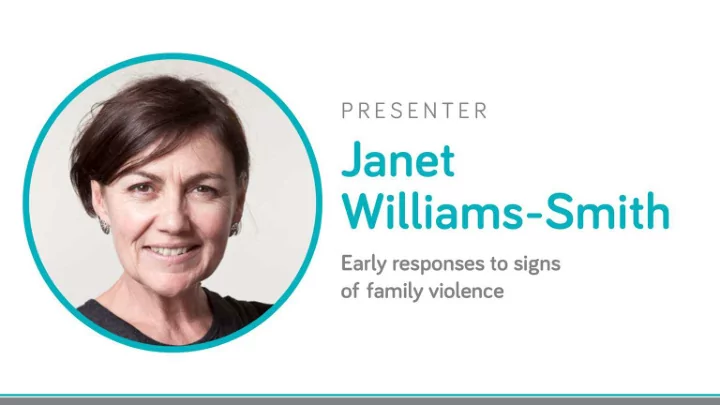

Family Violence Responding to Family Violence in Early Childhood Settings
Difficult Conversations with Families What are the barriers? Don’t know what to say Worried about causing trouble or more trouble My manager won’t like me prying Is it my place to question what’s happening in other peoples families What if I’m wrong They might stop coming to kinder I don’t want to have to report anything
Vortex of Violence
Case Scenario 1 During morning tea Jess tells her teacher that her daddy hit her mummy in the tummy with a big ball and it made mummy cry. Jess said she was scared about mummy crying and mummy told her not to tell anyone or daddy would hurt her more and more. How do you respond to Jess as she tells you this? Who else do you tell? When do you tell them and why? What kind of conversation would you be having with Jess’s mum?
Case Scenario 2 There’s been a family attending your service all year. You have always had a bit of a worry about Billie the three year old in your room. He always comes in a bit smelly, he’s always hungry but you can see that his mum really loves and cares about him. One day, Mel, Billie’s mum drops him off and you notice that she has bad bruising around her neck and arms. Billie is also really unsettled and starts shouting at you and refusing to stay at kinder. What do you do? How would you broach a conversation with Mel? Would you call anyone? How would you manage Billie? What is your priority?
Case Scenario 3 James is a little boy that has been at your service for about six weeks. His parents recently moved into the area from interstate. James has had lots of difficulties settling into the program and regularly lashes out at staff and other children, scratching and hitting. He finds it really difficult to sit still and runs around all over the place most of the time. One day you approach him out in the garden. He is petting one of the guinea pigs. As you get nearer you see that he is squeezing the guinea pig really hard and there is blood on his hands. How do you feel towards James? What do you do? Who do you tell? What do you say? Is this a reportable incident?
Case Scenario 4 The children are having a picnic outside in the garden. You overhear Mujahid telling Rachael that his daddy hit him on the head and it made him cry. Mujahid went on to tell Rachael that he hates his dad and when he grows up he’s going to hit him hard. Rachael said that she will tell her dad and her dad can come round and bash him. What do you do? Do you report this to child protection? Who do you tell? What do you say to Mujahid?
Case Scenario 5 Coleman is a little 7 month old baby in your infants room. He is very quiet and compliant. He sleeps a lot and barely moves. He’s not yet crawling and is avoidant in his eye contact. Sometimes he shudders and doesn’t really like being cuddled. He has a sibling in the kinder room who shouts and swears and Coleman’s mum is often heard swearing at Coleman and his brother. Would you be worried? What would you do? Is this reportable? Would you talk to Coleman’s mum?
Case Scenario 6 Tracey, your colleague (and kind of friend) turns up at work one morning really teary and upset. You ask her if everything is okay and does she need to go home. She bursts into tears and tells you that her husband hit and punched her last night and her two children heard it and were frightened. She shows you a bruise on her upper arm saying that she doesn’t want your manager to know so please don’t tell anyone. What do you say? Can you do nothing? What do you do? Is this reportable?
TOOLS SCRIPTS TOOLS “I’m worried about you.” Relationships “I think you’re frightened” Empathy “I can see that things are not Transparency right” Validation “You seem worried and upset” Carefulness “I am here for you” Authenticity “I will be asking you again Time tomorrow.” In control but NOT controlling
FEELINGS ACTIONS Vulnerable Look after yourself. This is NOT the job of your colleagues or your manager. It’s really important to take care of your own vulnerability. It is your job to ensure your vulnerability is well cared for by you. Treat it like a precious stone. Protect it, guard it, keep it safely locked away when you are busy. Ask a family member or loved one to take care of it for you while you are at work. Use EAP. Take time out if you need to. Work is not the place to manage your vulnerabilities Frightened Identify your fear. Talk to your manager and peers for support and reassurance Uncertain Trust your instincts. Seek information and clarity. Check in with your manager and colleagues Disbelieving Remember this is not your truth. It’s not up to you to believe. It’s up to you to act even if that act is to pass this to you colleague/manager Angry Keep the trauma lens in sight. Out of Control Take time out. Talk to a colleague. Remember the trauma framework. Manage your feelings away from your charges Traumatised/ Disclosures may trigger your own trauma. Recognise this, take it away from the situation/work, seek Triggered support/counselling and go to your safe place
Recommend
More recommend